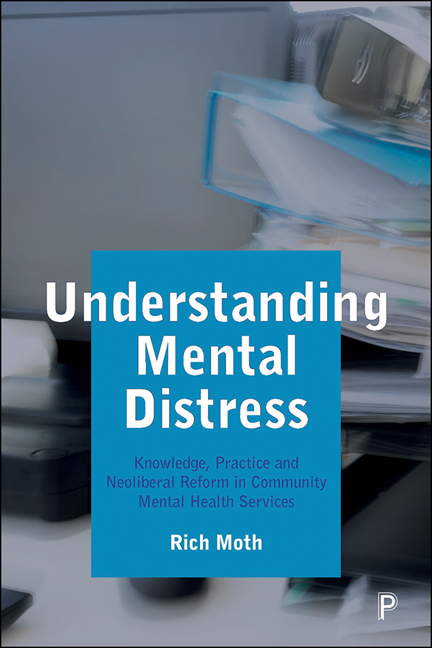 Understanding Mental Distress
Understanding Mental Distress Book contents
- Frontmatter
- Dedication
- Contents
- List of tables
- List of abbreviations
- Notes on the author
- Acknowledgements
- Introduction
- PART I Sociohistorical contexts of policy and practice
- PART II Lived experiences of neoliberal reform
- PART III Theorising knowledge and practice
- Conclusion
- Appendix: methodology
- Notes
- References
- Index
7 - Shifting contours of managerial control
Published online by Cambridge University Press: 08 October 2022
- Frontmatter
- Dedication
- Contents
- List of tables
- List of abbreviations
- Notes on the author
- Acknowledgements
- Introduction
- PART I Sociohistorical contexts of policy and practice
- PART II Lived experiences of neoliberal reform
- PART III Theorising knowledge and practice
- Conclusion
- Appendix: methodology
- Notes
- References
- Index
Summary
The previous chapter provided an overview of the Rehabilitation and Recovery Team (RRT) model that superseded the Community Mental Health Team (CMHT). The RRT represented an evolution of NHS institutional structures that more firmly embedded neoliberal priorities and forms of control in its organisational design. However, institutional reforms such as this should always be understood as the outcome of interactions between agents shaped by particular conditions of sociostructural possibility.
This chapter gives a more granular picture of forms of agency in this setting. There are three parts to the chapter. First, nurse and trade union activist Roger offers an overview of the shifting landscape of relations between trade unions and senior managers from the latter stages of the community care era up until the RRT restructure. Second, the disciplining and victimisation of team manager Evelyn provides a case study of intensified processes of managerial control during this period. The third section then examines how Roger, Evelyn and other practitioners responded, both individually and collectively, to these organisational reforms and shifting frontiers of control.
Shifting frontiers of control in statutory mental health services
Power and conflict in the labour process: Roger's perspective
We begin with Roger, who was a leading figure in organising a strike by mental health nurses in 1992, when he and his colleagues were employed by the local health authority, the forerunner of the current NHS Trust. Roger recalled this experience fondly: “It was just wonderful.”
He explained that the dispute had arisen after two senior managers had come to a weekly meeting of mental health nurses from across the health authority. The managers announced that “they’d been looking at the way staffing was organised and said there was going to be a new way of working, a thing called ‘skills mix’, which basically was about [staffing] cuts”. Furthermore, the four nurses whose posts were earmarked to be cut were all from racialised communities or non-British nationality backgrounds. Some other posts were also downgraded, meaning salary reductions. Roger described the mood of shock in the room after the managers left. “We couldn't believe it, nobody could take it in.” One of the senior nurses present, who was also an active trade unionist, turned to those gathered and said: “If you’re worried about it then you’ve got to do something about it.
- Type
- Chapter
- Information
- Understanding Mental DistressKnowledge, Practice and Neoliberal Reform in Community Mental Health Services, pp. 159 - 172Publisher: Bristol University PressPrint publication year: 2022


